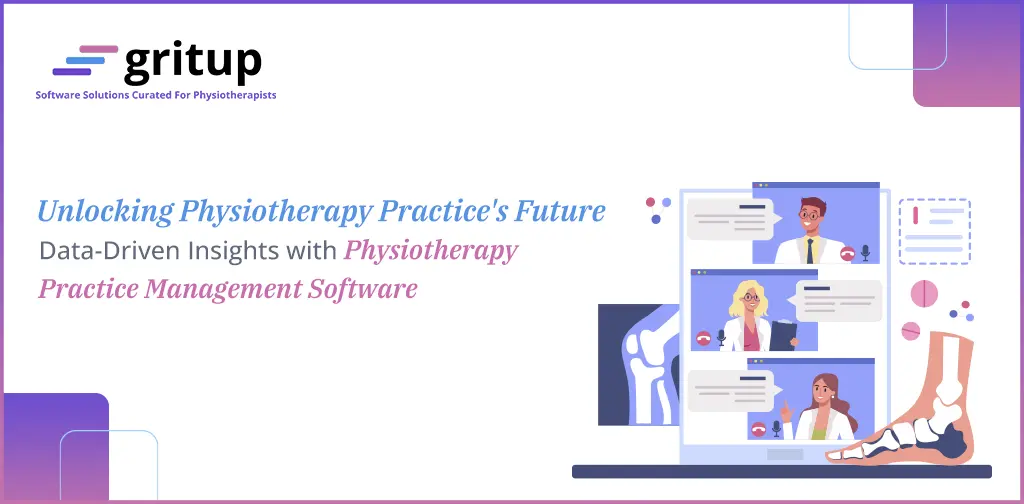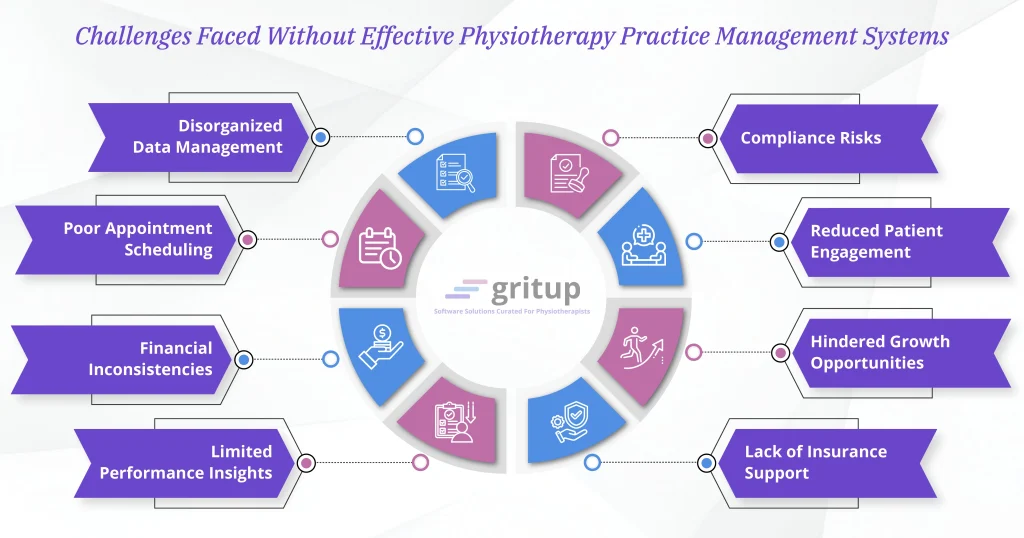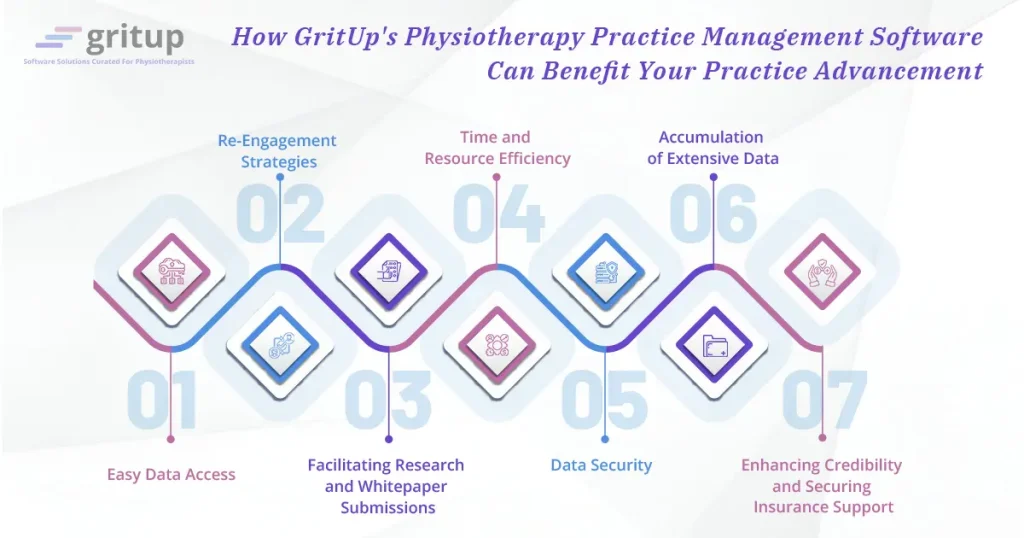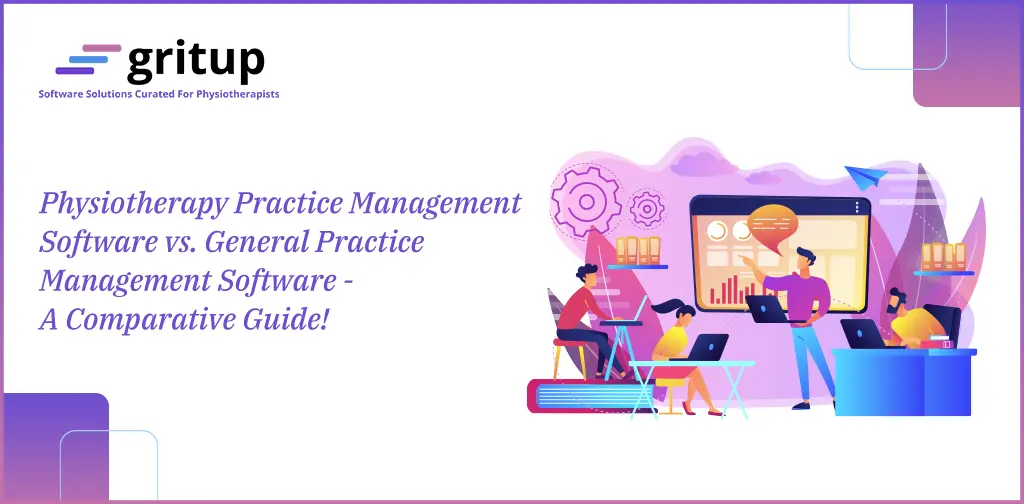
The Significance of Data in Physiotherapy Practice: From Business Efficiency to Patient-Centric Care
Recognizing the importance of physiotherapy practice data is essential for success as it provides insights vital for optimizing patient care and clinic operations. Effective data and record management is paramount for physiotherapists, offering essential insights from both business and physiotherapy practice perspectives.
Significance of Data from Business Standpoint
- Staff Scheduling and Availability
Data on therapists’ schedules, availability, and workload to manage appointments effectively. - Billing & Financial Data: Records of payments, insurance claims, invoices, and expenses for financial management.
- Inventory & Supplies: Information about equipment, supplies, and inventory levels to ensure adequate stock and smooth clinic operations.
- Performance Metrics: Metrics tracking patient outcomes, clinic efficiency, and staff productivity for continuous improvement. Moreover, tracking patient acquisition helps in devising targeted marketing strategies to expand the client base.
- Regulatory Compliance: Data records related to compliance with physiotherapy regulations, documentation requirements, and patient confidentiality.
Significance of Data from Physiotherapy Practice Point of View
- Patient Records: It is important to maintain information about patients’ medical history, treatments, progress notes, and appointment schedules.
- Treatment Plan: Physiotherapists need to categorize patients based on their conditions enabling personalized treatment approaches. Also, maintaining details of prescribed exercises, therapies, and interventions tailored to each patient’s condition.
- Patient Review & Feedback: By analysing patients feedback and therapy outcomes, physiotherapists can gauge patient satisfaction levels and refine their approaches accordingly.
Navigating the Pitfalls: Challenges Faced Without Effective Physiotherapy Practice Management Systems
Effective physiotherapy practice management systems play a crucial role in ensuring the seamless organization, analysis, and utilization of data within a practice. However, without such systems in place, physiotherapy practices may encounter a variety of challenges that hinder their ability to manage data efficiently. Let’s explore some potential obstacles :
- Disorganized Data Management:
Without a centralized system, data may be scattered across various platforms or stored in disparate formats, making it challenging to access and analyze. This lack of organization can lead to inefficiencies in retrieving patient records, tracking treatment outcomes, and monitoring practice performance.
- Inefficient Appointment Scheduling
Without an integrated scheduling system, managing therapist availability, patient appointments, and clinic resources becomes cumbersome. This can result in scheduling conflicts, overbooking, or underutilization of resources, ultimately affecting patient access and practice revenue.
- Financial Inconsistencies
In the absence of robust billing and financial management capabilities, practices may struggle to accurately track payments, process insurance claims, and manage expenses. This can lead to billing errors, delayed reimbursements, and financial discrepancies that impact the practice’s revenue stream and financial stability.
- Limited Performance Insights
Without comprehensive performance metrics, practices may lack visibility into key indicators such as patient outcomes, clinic efficiency, and staff productivity. This hampers the ability to identify areas for improvement, optimize workflows, and enhance overall practice performance.
- Compliance Risks
Inadequate data management systems can pose risks to regulatory compliance, including issues related to patient privacy, data security, and documentation requirements. Failure to comply with physiotherapy regulations and healthcare standards not only exposes the practice to legal liabilities but also undermines patient trust and confidentiality.
- Reduced Patient Engagement
Without tools for patient communication and engagement, practices may struggle to maintain meaningful connections with patients outside of scheduled appointments. This can impact patient adherence to treatment plans, satisfaction levels, and ultimately, the effectiveness of therapy outcomes.
- Hindered Growth Opportunities
The lack of a robust practice management system limits the practice’s ability to scale and expand its services. Without efficient data management and analysis, practices may miss out on opportunities for growth, innovation, and competitive differentiation in the increasingly dynamic healthcare landscape.
- Lack of Insurance Support
Securing data for insurance companies has been a major challenge for physiotherapists, unlike other medical specialties. The efficacy or importance of exercise or any treatment protocol needs to be verified and legitimized through trials and studies, which require extensive data collection.
Discover How GritUp’s Physiotherapy Practice Management Software Can Benefit Your Practice Advancement
GritUp offers a comprehensive Patient Management System, tackling key challenges encountered by physiotherapists through its innovative features, thereby makes managing your physiotherapy practice easier.
We are not a one-size-fits-all software. We aim to create change in the PT community by offering physiotherapists the opportunity to express, explore, and be themselves in various roles, whether as clinicians or practitioners.
Here are some of the key benefits of leveraging our software solutions for your Practice Data Management:
- Easy Data Access
With GritUp, physiotherapists have the flexibility to retrieve patient records from any location and at any time. This effortless accessibility enhances patient care by guaranteeing instant access to the latest information, empowering you with comprehensive insights whenever needed.
- Re-Engagement Strategies
Utilising your practice and patient data to re-engage with patients through workshops and research opportunities fosters continuous improvement and patient involvement.
- Facilitating Research and Whitepaper Submissions
The availability of comprehensive historical data enables physiotherapists to contribute to research and publish whitepapers, advancing their physiotherapy field.
- Time and Resource Efficiency
Our system will automate your administrative duties, allowing you to allocate your time more effectively to patient care.
- Data Security
Our PPMS system utilizes robust security measures to safeguard patient information, incorporating encryption and access controls to ensure adherence to privacy regulations.
- Accumulation of Extensive Data
Over time, the collection of practice data offers physiotherapists invaluable insights into patient conditions and treatment outcomes. This data-driven approach enhances decision-making, identifies treatment trends, and supports research initiatives. Ultimately, it empowers physiotherapists to deliver superior care, driving continuous improvement and innovation within their field and practice.
- Enhancing Credibility and Securing Insurance Support
Our PPMS facilitates extensive data collection for physiotherapy research, enabling the verification and legitimization of treatment protocols through credible studies. This robust evidence will help demonstrate the efficacy of physiotherapy to insurance companies, ultimately securing support and recognition for the profession.
Conclusion
In the realm of physiotherapy, the integration of data has become indispensable for delivering personalized, effective care. Throughout this discussion, we’ve seen how data-driven approaches empower practitioners to tailor treatments, monitor progress, and predict outcomes with precision, ultimately improving patient experiences and results.
GritUp’s Physiotherapy Practice Management Software stands out as a crucial tool in this journey, offering comprehensive solutions for collecting, analyzing, and utilizing patient data. By streamlining operations and providing real-time insights, GritUp enables physiotherapists to optimize their practice and deliver superior care efficiently.
Looking ahead, the integration of data-driven approaches promises to continue reshaping physiotherapy practice. With GritUp’s support, practitioners are equipped to thrive in this evolving landscape, delivering impactful care that transforms lives.




